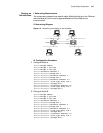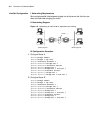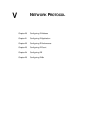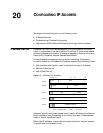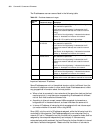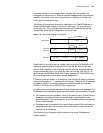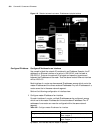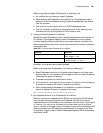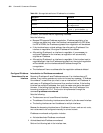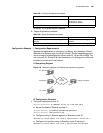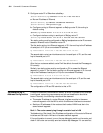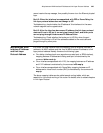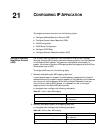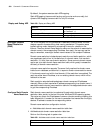
IP Address Overview 321
When configuring the master IP address for an interface, note:
■ An interface can only have one master IP address.
■ When deleting the IP address of the interface, if no IP address and mask is
specified, all the IP addresses (including all slave IP addresses) will be deleted
from the interface.
■ One router can be configured with up to 200 IP addresses at most.
■ Only the Loopback interface can be configured with 32-bit mask and other
interfaces can only be configured with 30-bit mask at most.
2 Configure slave IP address of an interface
Besides the master IP address, at most 4 slave IP addresses can be configured on
an interface. The purpose of assigning slave IP addresses is to have the same
interface located in different sub-nets, so as to create network routes with the
same interface as the output port, and set up connection via the same interface to
multiple sub-nets.
Table 353 Configure slave IP address of an interface
By default, the interface has no slave IP address.
When configuring slave IP addresses for an interface, please note:
■ Slave IP addresses cannot be on the same network segment with each other
and they cannot be on the same network segment with the master IP address.
Otherwise, the system will prompt:
■ IP address configured now conflicts with others.
■ If the interface is not configured with the master IP address, the first configured
IP address will become the master IP address automatically.
■ When there are slave IP addresses on the interface, the master IP address
cannot be deleted. Otherwise, the system will prompt:
Must delete secondary before deleting primary.
3 Set negotiable attribute of an IP address for an interface
When an interface is encapsulated with PPP, but not configured with IP address
while the peer has been configured with IP address, the user can configure
negotiable attribute of IP address on the interface on the local router. (To configure
ip address ppp-negotiate command on the local router, and to configure
remote address on the peer router) In this case, the local router can accept the IP
address originated from PPP negotiation and allocated by the peer router. Such
configuration is mainly used to obtain IP address allocated by ISP when accessing
the Internet via ISP.
Operation Command
Configure slave IP address of an interface ip address ip-address { mask |
mask-length } sub
Delete slave IP address of an interface undo ip address ip-address { mask
| mask-length } [ sub ]



